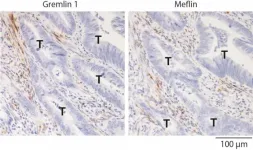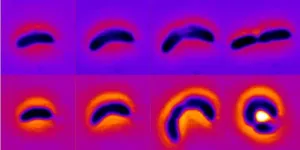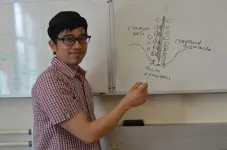(Press-News.org) (Singapore--January 30, 2021 11:00 p.m. SPT/January 30, 2021 10:00 a.m. EST)-- A study presented today by researchers with the Ministry of Health and Welfare in Taiwan confirmed the effectiveness of low-dose computed tomography (LDCT) screening in a pre-defined, never-smoker, high-risk population. The research was presented today at the International Association for the Study of Lung Cancer 2021 World Conference on Lung Cancer.
In Taiwan, lung cancer is the leading cause of cancer mortality, and 53% of those have died of lung cancer were never-smokers. The National Lung Cancer Screening Trial (NLCST) and NELSON Trials demonstrated that the use of low-dose CT is effective for lung cancer screening; however, most of the lung cancer screenings focused on heavy smokers, which may not be suitable for an East Asian population as this population tend to have higher incidence of lung cancer in never-smokers.
The researchers, led by Dr. Pan Chyr Yang, of the National Taiwan University College of Medicine, Taipei/Taiwan, developed by the Taiwan Lung Cancer Screening for Never Smoker Trial (TALENT), a nationwide lung cancer LDCT screening study focused on never-smokers. TALENT's goal is also to develop an effective strategy for screening of lung cancer in never-smoker and establish a risk prediction model to identify high-risk population that may benefit from LDCT screening.
The TALENT study enrolled and followed 12,011 individuals between February 2015 and July 2019. To be enrolled in the trial, participants must have been between 55 and 75 years of age and never-smokers. In addition, participants must have had one of the following risk factors for lung cancer: family history of lung cancer within the third-degree of relations, passive smoking exposure, tuberculosis or chronic obstructive pulmonary disease, cooking index of 110 or greater, and absence of ventilation during cooking.
Of the 12,011 individuals, 6,009 (50 %) had family history of lung cancer, and 2,094 (17.4%) were considered positive on screening. Of these, 395 participants (3.3%) underwent lung biopsies or surgeries. Lung cancer (2.6%) was diagnosed in 313 patients, with 255 (2.1%) diagnosed with invasive lung cancer--all but one was adenocarcinoma and 96.5% were diagnosed with stage I disease. The remaining 81 patients had benign lung disease or a malignancy other than cancer.
The prevalence of lung cancer was 3.2% and 2.0% (p < 0.001) in participants with and without lung cancer family history, respectively. The prevalence of invasive lung cancer was 2.6% and 1.6%, respectively. The lung cancer risk increased with the number of first-degree relatives with lung cancer (0: 2.0%, 1: 3.1%, 2: 4.0%, 3: 6.7%, ? 4: 9.1%; p < 0.001).
"Most importantly, 96.5% patients were stage 0 or 1, [and] were potentially curable by surgery," said Dr. Yang. "Our study also revealed the high risk of family history, especially those [participants] with a first-degree family history of lung cancer."
"The study revealed that LDCT screening for lung cancer in never-smoker with high risk may be feasible, which is very important to all who are fighting against lung cancer, [considering] the increasing global threat for lung cancer in never-smoker. Most importantly, the study showed that family history of lung cancer may increase the risk of lung cancer," he added.
Dr. Yang said his team plans to develop a risk score predictor that includes the family history, and genetic and environmental factors for identification of high-risk population who can benefit from LDCT screening for lung cancer in never-smokers. A standard screening protocol will be established, and Dr. Yang and his team will advise the authority to formally implement the LDCT for lung cancer screening in Taiwan.
"We hope the screening program can benefit patients suffering from lung cancer especially in those countries with high incidence of lung cancer in never smoker," he said.
"This study paves the way to additional studies in this unique group of high-risk individuals," Dr. Scagliotti, IASLC interim CSO said, "in order to maximize the benefits of early detection of lung cancer."
INFORMATION:
About the IASLC:
The International Association for the Study of Lung Cancer (IASLC) is the only global organization dedicated solely to the study of lung cancer and other thoracic malignancies. Founded in 1974, the association's membership includes nearly 7,500 lung cancer specialists across all disciplines in over 100 countries, forming a global network working together to conquer lung and thoracic cancers worldwide. The association also publishes the Journal of Thoracic Oncology, the primary educational and informational publication for topics relevant to the prevention, detection, diagnosis, and treatment of all thoracic malignancies. Visit http://www.iaslc.org for more information.
About the WCLC:
The WCLC is the world's largest meeting dedicated to lung cancer and other thoracic malignancies, attracting more than 7,000 researchers, physicians and specialists from more than 100 countries. The goal is to increase awareness, collaboration and understanding of lung cancer, and to help participants implement the latest developments across the globe. The conference will cover a wide range of disciplines and unveil several research studies and clinical trial results. For more information, visit wclc2020.iaslc.org.
(Singapore--4:45 p.m. SPT/3:45 a.m. EST January 30, 2021--Using a host immune classifier (HIC) test for patients with non-small cell lung cancer (NSCLC) may provide better predictors of treatment response and improve outcomes, according to research presented today at the International Association for the Study of Lung Cancer's 2020 World Conference on Lung Cancer Singapore.
Immune checkpoint inhibitors have revolutionized cancer care in patients with advanced stage aNSCLC, but better predictors of treatment response are still needed to guide treatment decisions for patients diagnosed with NSCLC, according to Dr. Wallace Akerley, of Huntsman Cancer Institute in Salt Lake City, Utah. HIC (Host Immune Classifier) is a serum proteomic measure of inflammation. ...
Nagoya University researchers and colleagues have revealed that colorectal cancer tissues contain at least two types of fibroblasts (a type of cells found in connective tissue), namely, cancer-promoting fibroblasts and cancer-restraining fibroblasts, and that the balance between them is largely involved in the progression of colorectal cancer. Their findings, recently published in the journal Gastroenterology, suggest that artificially altering the balance between the two types of cells could curb the spread of colorectal cancer tumors, which may become an effective strategy for preventing cancer progression.
Cancer tissues comprise both cancer cells and non-malignant cells such as fibroblasts. Previous studies have suggested that the proliferation of fibroblasts ...
(Singapore--January 29, 2021 9:35 a.m. SPT/January 28, 2021 8:35 p.m. EST)--Two radiation oncology trials presented at the IALSC World Conference on Lung Cancer Singapore highlight how some researchers are exploring use of higher radiation boost doses to only PET-positive regions in locally-advanced non-small cell lung cancer (NSCLC). A previous large RTOG phase III trial revealed that the unform delivery of a high dose to the entire tumor led to poorer survival.
In one study, Prof. Feng-Ming (Spring) Kong, Case Western Reserve University School of Medicine, in Cleveland, Ohio presented the results of a multicenter trial which aimed to ...
(Singapore Embargoed for 7:23pm EST on January 29, 2021 to coincide with publication in the Journal of Clinical Oncology) -- Adding ipilimumab to pembrolizumab does not improve efficacy and is associated with greater toxicity than pembrolizumab alone as first-line therapy for metastatic non-small cell lung cancer (NSCLC) for patients with a PD-L1 tumor proportion score of greater than or equal to 50% and no targetable EGFR or ALK aberrations, according to research presented today at the International Association for the Study of Lung Cancer's World Conference on Lung Cancer.
The research was presented ...
New research led by Carnegie Mellon University Assistant Professor of Physics Shiladitya Banerjee demonstrates how certain types of bacteria can adapt to long-term exposure to antibiotics by changing their shape. The work was published this month in the journal Nature Physics.
Adaptation is a fundamental biological process driving organisms to change their traits and behavior to better fit their environment, whether it be the famed diversity of finches observed by pioneering biologist Charles Darwin or the many varieties of bacteria that humans coexist with. While antibiotics have long helped people prevent and cure bacterial infections, many species of bacteria have increasingly been able to adapt to ...
School closures during COVID-19 have decreased access to school meals, which is likely to increase the risk for food insecurity among children in Maryland, according to a new report issued by researchers at the University of Maryland School of Medicine (UMSOM). The number of meals served to school-age children during the first three months of the pandemic dropped by 58 percent, compared to the number of free or reduced-price meals served the previous spring. As a result, thousands of children across the state were placed at increased risk of food insecurity, with many likely experiencing the health ramifications ...
Boulder, Colo., USA: GSA's dynamic online journal, Geosphere, posts articles online regularly. Topics for articles posted for Geosphere this month include feldspar recycling in Yosemite National Park; the Ragged Mountain Fault, Alaska; the Khao Khwang Fold and Thrust Belt, Thailand; the northern Sierra Nevada; and the Queen Charlotte Fault.
Feldspar recycling across magma mush bodies during the voluminous Half Dome and Cathedral Peak stages of the Tuolumne intrusive complex, Yosemite National Park, California, USA
Louis F. Oppenheim; Valbone Memeti; Calvin G. Barnes; Melissa Chambers; Joachim Krause ...
Abstract: Incremental pluton growth can produce sheeted complexes with no magma-magma interaction or large, dynamic magma bodies communicating via crystal and melt exchanges, depending ...
Washington, DC — Blood pressure that remains elevated over of time — known as chronic hypertension — has been linked to heart disease, which is the leading cause of death in the United States. Recent research has shown that persistent high blood pressure may also increase the risk for stroke and overall mortality. Yet, only about 1 in 4 adults with chronic hypertension have their condition under control, according to the Centers for Disease Control and Prevention.
In a new study to be presented today at the Society for Maternal-Fetal Medicine's (SMFM) annual meeting, The Pregnancy Meeting™, researchers from the University of Pittsburgh will unveil findings that suggest that women who develop high blood pressure during pregnancy and who continue ...
News reports indicate COVID-19 vaccines are not getting out soon enough nor in adequate supplies to most regions, but there may be a larger underlying problem than shortages. A University of California, Davis, study found that more than a third of people nationwide are either unlikely or at least hesitant to get a COVID-19 vaccine when it becomes available to them.
The results are from public polling of more than 800 English-speaking adults nationwide in a study published online earlier this month in the journal Vaccine.
"Our research indicates that vaccine uptake will be suboptimal ... with 14.8 percent of respondents being unlikely to get vaccinated ...
WOODS HOLE, Mass. -- The most powerful substance in the human brain for neuronal communication is glutamate. It is by far the most abundant, and it's implicated in all kinds of operations. Among the most amazing is the slow restructuring of neural networks due to learning and memory acquisition, a process called synaptic plasticity. Glutamate is also of deep clinical interest: After stroke or brain injury and in neurodegenerative disease, glutamate can accumulate to toxic levels outside of neurons and damage or kill them.
Shigeki Watanabe of Johns Hopkins University School of Medicine, a familiar face at the Marine Biological Laboratory (MBL) as a faculty member and researcher, is hot on the ...



